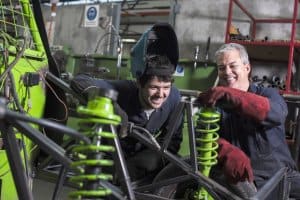
EIT engineering tutor Shane Cameron helping engineering student Charlie Kapene get ready for a bright future
Engineers are desperately needed in Gisborne and around the world. EIT’s engineering programme starts next week and still has a few places available.
“Engineering is one of those great trades to get into. If I had my time again that’s the road I would go down because I would learn all the skills through an engineering apprenticeship. I would use those skills to specialise or advance into other areas. It’s a stepping stone for anything. Electronics, robotics . . . there’s nothing man-made on the planet that’s not engineered” says Tim Jagusch, EIT Assistant Head of School – Trades and Technology.
The one year programme will put a graduate in a position where they are likely to be snapped up as an apprentice by one of the many Gisborne businesses that need engineers to maintain the terrific growth they are experiencing — alongside a growing skill shortage.
“We have companies like Pultron in Gisborne. I don’t think people understand how big they are. We have a couple of graduates who joined Pultron and they are just excelling — one went to Dubai, it’s incredible. A local business has gone from two staff to 22. They doubled their staff last year and still can’t keep up with orders. They have work for two years ahead. We’re getting plants built and they all require on-going work and maintenance.”
Over the course of the year at EIT, students learn welding, machining and fabrication, so it gives them the base skills to enter the industry where they can specialise in one, or use all three. There are fantastic work opportunities, he says.
Part of the challenge getting young people interested in engineering is explaining the variety of work says EIT engineering tutor Shane Cameron. Shane had a successful career in engineering before deciding to “give back” some of his experience to young people.
“People don’t necessarily know what engineering involves but there is a huge demand for qualified people. Once you have your qualifications you’re a wanted person — you can get a job anywhere. We listen to the national industry providers and teach what they want — stainless steel TIG welding for the wine and food industries, aluminium and MIG welding for boat building. We work around what industry wants.
“You can see the students faces when the penny drops and they have the skills.”
